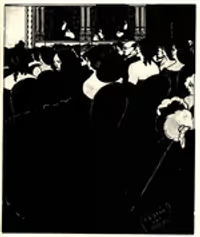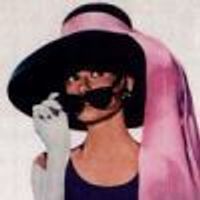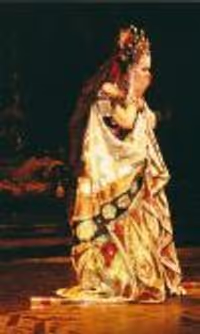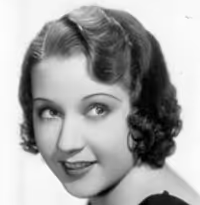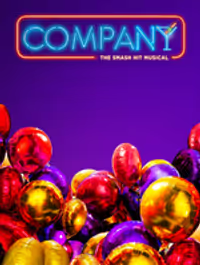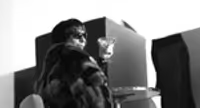MERRILY WE ROLL ALONG Reviews
#201MERRILY WE ROLL ALONG Reviews
Posted: 11/29/23 at 2:47am
I think in the current version we are supposed to understand from Mary's comments at the party that while the film may have been a hit, it isn't actually very good, and in particular the performance by the young actress was pretty bad.
bear88
Broadway Legend Joined: 4/26/16
#202MERRILY WE ROLL ALONG Reviews
Posted: 11/29/23 at 3:27am
inception said: "I think in the current version we are supposed to understand from Mary's comments at the party that while the film may have been a hit, it isn't actually very good, and in particular the performance by the young actress was pretty bad."
It’s not even totally clear the movie will be a hit. Frank semi-apologizes for it to Mary, describing it as a formula picture while promising that the next one will actually be good. Mary insults the screenwriter and leading actress about the film, and even the praise from one of the hangers-on, ‘I love a movie movie,’ makes it clear that Frank isn’t aiming particularly high. The compliments from the hangers-on don’t come across as terribly sincere. At best, it’s a crappy movie that will do good box office.
Meanwhile, we learn that Frank’s son didn’t invite him to his graduation. Frank, as played by Jonathan Groff, seems gripped by self-loathing even as tries to be the life of the party. And everything grinds to a halt when a guest lauds Charley’s award-winning Broadway play.
’That Frank’ accomplishes its job, introducing us to the main character, seemingly on top of the world based on his material success but miserable at a party that keeps getting more ugly.
#203MERRILY WE ROLL ALONG Reviews
Posted: 11/29/23 at 8:33am
So glad to hear Lindsay is back in!
if any of the 3 leads are out, can tickets be exchanged? Just curious.
#204MERRILY WE ROLL ALONG Reviews
Posted: 11/29/23 at 9:00am
NYadgal said: "So glad to hear Lindsay is back in!
if any of the 3 leads are out, can tickets be exchanged? Just curious."
Yes
#205MERRILY WE ROLL ALONG Reviews
Posted: 11/29/23 at 9:34am
Probably not EXCHANGED. Most box offices give you a refund, then you have to repurchase, so if the cost is higher you have to pay the current cost.
#206MERRILY WE ROLL ALONG Reviews
Posted: 11/29/23 at 10:47am
EricMontreal22 said: "joevitus said: "
Anyway, I'd never thought about it until listening to the 1994 cast the other day for the first time in years, but what is the motivation for Frank looking back on his life if in fact he's still a wildly successful producer? In the original version, he's just released a massive bomb and seems to be going from Big Time Insider to Pariah-On-the-Way-Out as a result. The graduation he's giving a commencement speech at is, essentially, the spot of a breakdown in the face of that, in which he explores his past to figure out his present.
But if, with "That Frank," he's still a big success, what is causing him to re-examine his life?
I think these are great points--and why for me something is still missing without the graduation framework--it does become a bit of a "well why?" show. I'll have to check my copy of the 81 script but I didn't think his movie was a huge bomb--financially--it was just a terrible movie, but I realize I may have misunderstood that. But yes, in the revision apparently he's even producing good movies?
I dunno...
"
You could well be right about it not being a bomb. With the lyrics "Terrible--beautiful, Frank!" and "When a movie's that bad what on earth can anyone say?" I assumed it must be a roaring flop for the in-crowd to turn on him--they seem all about fame and monetary success, not works of integrity, so I assumed the movie was an obvious bomb. But quite possibly it wasn't. I've never read the script, so I'm going on my memory of hearing the dialogue in rehearsal and performance.
I don't know if the production I saw made the change, or it reflects the rewrites at La Jolla, but the title of the movie was changed from whatever it was on Broadway to The Hills of Tomorrow, which I thought was interesting, suggesting both Frank cannibalizing his past (again--all his songs are variations on that graduation hym) and maybe yearning to regain his youthful idealism.
#207MERRILY WE ROLL ALONG Reviews
Posted: 11/29/23 at 10:51am
I really appreciate all the comments about "That Frank" and how/why it works as a replacement.
#208MERRILY WE ROLL ALONG Reviews
Posted: 11/29/23 at 10:37pm
During tonight's curtain call/red bucket speech, Jonathan Groff pointed out that yesterday was the anniversary of the closing night of the original production, and today is the anniversary of when the original cast album was recorded, at which point he acknowledged a group of 10 original cast members in the audience.
#209MERRILY WE ROLL ALONG Reviews
Posted: 11/29/23 at 11:05pm
joevitus said: "You could well be right about it not being a bomb. With the lyrics "Terrible--beautiful, Frank!" and "When a movie's that bad what on earth can anyone say?" I assumed it must be a roaring flop for the in-crowd to turn on him--they seem all about fame and monetary success, not works of integrity, so I assumed the movie was an obvious bomb. But quite possibly it wasn't. I've never read the script, so I'm going on my memory of hearing the dialogue in rehearsal and performance.
I don't know if the production I saw made the change, or it reflects the rewrites at La Jolla, but the title of the movie was changed from whatever it was on Broadway to The Hills of Tomorrow, which I thought was interesting, suggesting both Frank cannibalizing his past (again--all his songs are variations on that graduation hym) and maybe yearning to regain his youthful idealism."
First, I have to say that I'm a bit embarrassed if all this time I thought in the revised version his movie wasn't meant to be so bad--I should really should look at, at the least, the video of the London filmed version of this production before making such statements. For the record, I did just check the original 1981 script and the title of the film back then was "Light Out of Darkness--a Franklin Shepard Production." And, I'm not sure if it ever registered with me that now the title is "The Hills of Tomorrow"!
I do stand by the fact that, in the revival, I always had the impression (and I think Sondheim said this... somewhere) the movie is a success (or expected to be a success.)
Regardless, I admit I find all this discussion truly fascinating!
#210MERRILY WE ROLL ALONG Reviews
Posted: 11/30/23 at 12:29am
EricMontreal22 said: "I do stand by the fact that, in the revival, I always had the impression (and I think Sondheim said this... somewhere) the movie is a success (or expected to be a success.)
Regardless, I admit I find all this discussion truly fascinating!"
The impression I get is that the movie is a huge success (which is what draws in all the schmucks at the party), but it's a super shallow and uninspiring movie. Mary is disappointed in Frank selling out to make a dumb studio movie just for the money. She knows that he could be making truly incredible art.
bear88
Broadway Legend Joined: 4/26/16
#211MERRILY WE ROLL ALONG Reviews
Posted: 11/30/23 at 1:48am
One other thing about whether Frank's movie is a commercial success.
I think the story makes more sense if it is a box office hit. Frank would have everything he thought he wanted: commercial success after years of struggle and setbacks, the glamour of show business that always attracted him, the clout to make his own personal and business decisions - even if they're selfish. Why isn't he happy, though?
Jonathan Groff emerges pensive and Frank's desperation at the party, along with his embarrassment about the movie in a side comment to Mary, makes it clear that something has gone wrong. He knows the movie is terrible, he knows that he's lost everything and everyone that once mattered to him. Moreover, it bothers him - despite his forced bonhomie. His estranged friend Charley seems have threaded the needle that has eluded Frank - commercial success and an award-winning show. "How did you get to be here," indeed.
It's also the thing that wins at least a little audience sympathy, especially as portrayed by Groff, who plays Frank dead-eyed in the party scene and in a quiet fury during "Franklin Shepherd Inc.," when Charley treats him like a money-grubbing sellout just for wanting to make movies instead of composing a new musical.
#212MERRILY WE ROLL ALONG Reviews
Posted: 11/30/23 at 3:41am
bear88 said: "One other thing about whether Frank's movie is a commercial success.
I think the story makes more sense if it is a box office hit. Frank would have everything he thought he wanted: commercial success after years of struggle and setbacks, the glamour of show business that always attracted him, the clout to make his own personal and business decisions - even if they're selfish. Why isn't he happy, though?."
That makes sense to me. I just went through several boxes and found my print out of the 1981 script--this was the proof edition (with Sondheim's pencilled in corrections) that was ready to be published in 1982 by Dodd, Mead and Co, so reflects the final changes made to the show in the very long original previews and I know the opening was re-written a lot (Gussie doesn't push Meg into the pool--something that apparently always got a laugh in previews--nor does she throw iodine like in the revision.)
Anyway, reading the opening scenes while watching the 2013 video of the Maria Friedman production I was surprised at just how rewritten the opening scene is--not just a different song, but the dialogue, aside from some quips mostly from Mary, was all rewritten too.
Notably, Mary is a critic in the 1981 opening and everyone (mostly Frank and Meg) are curious what her review of the new movie will be--no mention of her becoming a novelist. She also at first holds back on saying anything mean, or anything at all about the movie, till near the end of the scene when it's noted how drunk she has become.
(There's also a character called "the protege" who tries to impress Frank and we are told wrote the score for the movie because he has a "newer" sound than Frank.)
As for the success of the movie--this is why I thought in the revision the movie is meant to be good, or at least successful. As you can hear from the 1981 cast album, the partygoers almost immediately make comments about the movie being terrible (though they say "beautiful" to his face.) "When a movie's that bad what can anyone say..." etc. And it's revealed that this is Frank's first big shot at making a movie--Gussie persuaded him to invest everything in it for a brand new start, so he's anxious to find out if it's a hit.
In That Frank and the revised script, while it's true no one comments if the movie is actually good (and Mary makes it clear she doesn't think it is,) The party goers instead though now say "I said Frank one day you'll be running the studio," call the movie a watershed, repeatedly say what a success he is, that Frank really knows what the public wants, has taste and talent, bla bla. Now it's easy to think they're being disingenuous and just feeding off of his success. Notably the lyric "when you make a movie that bad what can anyone say" is now "when you make a movie that successful where do you go? Paramount!"
Oh and no mention of his son at all in 1981. No withering "You are all junk and you, you deserve them" when Mary exits, instead she just says "If anyone deserves all this, you do.", Gussie doesn't even say she's leaving Frank (though she obviously is considering it--oh and she's upset because Frank doesn;'t care that she got a fancy interview about a dress line she's lending her name to or something.)
And of course in 1981 this was followed by two different scenes--1975 at a restaurant where Mary tricks Charley into meeting her (and sings Old Friend/Like it Was) because she knows Frank is coming there to be interviewed about his upcoming movie and she wants them to reconcile after the debacle of the TV interview the year before, and then 1974 where we get Franklin Shepard Inc. Oh in the 1975 scene there also is a bit more dialogue about why Frank has moved into movie producing (something in the revision I always found perfectly unclear.)
I know one of the first revisions Furth made for the 1985 LaJolla production was to combine these scenes--all now taking place in 1973 for whatever reason--so Like It Was is sung right before Franklin Shepard Inc and the interview, on the same day, which changes its meaning significantly
Anyway I won't blather on anymore but I hadn't thought to do a direct comparison before and it's been years since I read the 1981 script--while we all knew Furth made significant rewrites (even if Jesse Green and others act like the revival still has his old "awful" script) I didn't realize that at least in the opening scene it's a 90%+ rewrite. But in general I always think Furth gets an unfair rep for Merrily--he came to it after Sondheim and Prince had largely worked out what they wanted to do, and I actually think the book is pretty good. It doesn't help that, as anyone who tries to do research on Merrily or Company well knows, Furth basically hated to do interviews and rarely talked about his work let alone his revisions to Merrily or his more minor 1995/96 Company revisions (James Goldman--when discussing Follies--was only slightly better but you can find some quotes from him, and about the various revisions over the years as well as the 1987 Follies rewrite.)
#213MERRILY WE ROLL ALONG Reviews
Posted: 11/30/23 at 4:09am
AND I have a feeling few on here care about all these changes as much as I do so apologies for this long rambling post. But I will say I re-watched the 1981 bootleg that's on Youtube and was filmed right after opening (so doesn't have all the differences in previews) and watched those opening scenes and it reflects the publisher's proof of the script I have, with the only difference being in the bootleg during the title song transition from the party to the restaurant "Like it Was" scene, Charley and Mary both have short monologues talking about their diminishing friendship with Frank that were removed for the "almost published" script. If anyone can follow that.
So in brief, this confirms my belief that, if Frank's movie in the revival isn't necessarily said to be good (Mary acts like it isn't, his hanger-on friends act like it is, but very clearly they could just be talking about what an audience and commercial success it seems apparent it will be) it is implied it will be a further success for Frank, whereas in the 1981 original even the hanger-ons seem to all gleefully admit it's terrible and there seems a chance that it could be a financial and career disaster for Frank.
Which goes to what Bear said that in the revision its played that to the outside Frank's life is more successful than other, but all the 100% new dialogue makes it much more clear than in 1981 that his personal life and personal relationships is a complete ****ing mess.
bear88
Broadway Legend Joined: 4/26/16
#214MERRILY WE ROLL ALONG Reviews
Posted: 11/30/23 at 4:09am
Aside from the changes in dialogue, and the apparent though uncertain commercial success of Frank's movie, the start of the original show has a lot happening - graduation scene, Frank's speech, disappointed students - moving into what Stephen Sondheim described as "a kids' idea of a Hollywood party." And then there are additional scenes before we get to the big interview and "Franklin Shepherd Inc." That's a lot of stuff, a lot of characters, a confusing "kids' idea of a Hollywood party" scene than somehow turns more straightforward - but moving backwards. That's a lot for an audience to grasp in a new musical.
The revised show is streamlined. The graduation ceremony framing device is cut in favor of a memory play set-up that is much easier to understand and compellingly staged. The audience knows from the start whose story this is (there's only one scene without Frank in the entire show) and the question is: "How did you get so far off the track?"
The answer isn't that his movie bombed and his fair-weather Hollywood friends are mocking him behind his back at his own party.
The answer in the revival is something else, and that's what the show is about.
#215MERRILY WE ROLL ALONG Reviews
Posted: 11/30/23 at 9:20am
EricMontreal22 said: "AND I have a feeling few on here care about all these changes as much as I do so apologies for this long rambling post.
Eric you have just contributed the most interesting - in fact scholarly! - information to this board in weeks. Thank-you! This was a very good read!
Wayman_Wong
Broadway Legend Joined: 4/22/04
#216MERRILY WE ROLL ALONG Reviews
Posted: 11/30/23 at 1:37pm
Original 'Merrily' cast members visit the revival
https://www.broadwayworld.com/article/Video-Original-MERRILY-WE-ROLL-ALONG-Cast-Members-Visit-the-Broadway-Revival-20231130
#217MERRILY WE ROLL ALONG Reviews
Posted: 11/30/23 at 2:21pm
It's so oddly beautiful that these original cast members are receiving so much love through the success of this production.
#218MERRILY WE ROLL ALONG Reviews
Posted: 11/30/23 at 3:17pm
Entertainment Community Fund is hosting 4 performances in January and February on the following dates:
Wednesday, January 31, 7 pm ET - Wednesday, February 7, 7 pm ET - Tuesday, February 13, 7 pm ET - Wednesday, February 21, 7 pm ET
All seats are $214, and are located in side orchestra rows Q - S and dress circle row D.
https://entertainmentcommunity.org/performances-and-events/merrily-we-roll-along-1-4
#219MERRILY WE ROLL ALONG Reviews
Posted: 11/30/23 at 4:13pm
From last night:
https://www.instagram.com/p/C0R-75Hxbsc/
#220MERRILY WE ROLL ALONG Reviews
Posted: 11/30/23 at 4:57pm
inception said: "Eric you have just contributed the most interesting - in fact scholarly! - information to this board in weeks. Thank-you! This was a very good read!"
Thanks! This honestly is very sweet of you to say, and means a lot.
While I'm on a roll (rolling along?) I had one (final? I think) thing I wanted to say:
PegasusOasis
Understudy Joined: 7/9/22
#221MERRILY WE ROLL ALONG Reviews
Posted: 12/1/23 at 12:22am
Mary had a fat suit for “That Frank” in the 2019 Signature Theatre show.
In 2023, when Frank asks if she lost weight (referring to her ex) in the next scene, I thought maybe that was a double entendre leftover from the old version. It’s a jarring comment nonetheless, audience gasps.
Wayman_Wong
Broadway Legend Joined: 4/22/04
#222MERRILY WE ROLL ALONG Reviews
Posted: 12/3/23 at 7:57pm
In ''Opening Doors'' in the new revival of ''Merrily,'' Frank jokingly answers the phone: ''Russian Tea Room.'' But on the original cast album, Frank says; ''Chinese laundry.''
In ''Bobby and Jackie and Jack,'' Frank, Charley and Beth sing: ''We're bringing back style to the White House.'' And Beth, as Jackie O, adds: ''I'm painting it beige for a start.''
But on the original cast album, Beth sings: ''I'm painting it cream for a start.''
Are these minor lyric changes new to this Broadway revival? Or have they been in previous revivals? Any reason why? What other minor lyric changes are there?
Finally, in ''Now You Know,'' Frank's friends bid him ''bon voyage'' on his cruise. The song ends with ''Right! Right! Right! ... Now you know!'' I've seen other ''Merrilys,'' but this time I noticed that Mary seems to shout what also could be ''Write! Write! Write!'' And Mary yells amid the din: ''I love you, Frank!'' Or has this always been in there, too?
MezzA101
Broadway Legend Joined: 3/29/23
#223MERRILY WE ROLL ALONG Reviews
Posted: 12/4/23 at 11:32am
Meet the three Frank Jrs:
https://www.vulture.com/article/merrily-we-roll-along-broadway-cast-2023-frank-jr.html
#224MERRILY WE ROLL ALONG Reviews
Posted: 12/4/23 at 2:22pm
Wayman_Wong said: "In ''Opening Doors'' in the new revival of ''Merrily,'' Frank jokingly answers the phone: ''Russian Tea Room.'' But on the original cast album, Frank says; ''Chinese laundry.''
In ''Bobby and Jackie and Jack,'' Frank, Charley and Beth sing: ''We're bringing back style to the White House.'' And Beth, as Jackie O, adds: ''I'm painting it beige for a start.''
But on the original cast album, Beth sings: ''I'm painting it cream for a start.''
Are these minor lyric changes new to this Broadway revival? Or have they been in previous revivals? Any reason why? What other minor lyric changes are there?
Finally, in ''Now You Know,'' Frank's friends bid him ''bon voyage'' on his cruise. The song ends with ''Right! Right! Right! ... Now you know!'' I've seen other ''Merrilys,'' but this time I noticed that Mary seems to shout what also could be ''Write! Write! Write!'' And Mary yells amid the din: ''I love you, Frank!'' Or has this always been in there, too?"
The “Chinese laundry” line was changed for this revival, I believe to be more PC.
The current Company tour also changed the “Chinese techniques” lyric in “Have I Got a Guy For You” for the same reason.
Videos



